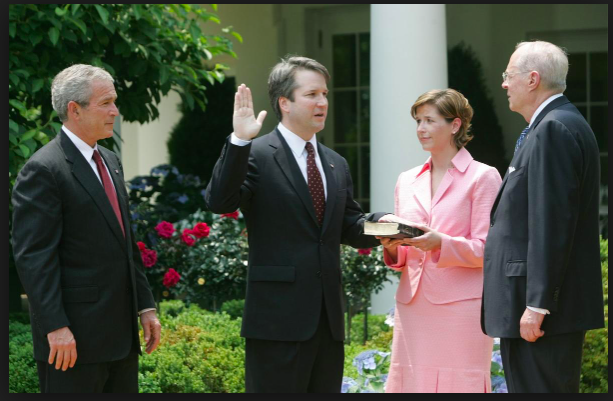
Do you believe that the contours of your relationship with other people should be determined by a group of 20- and 30-year-olds living 250 years ago?
This is what Brett Kavanaugh, Donald Trump’s new Supreme Court Justice pick, actually does believe.

He believes this because, even though he seems like a nice-enough, personable, normal-seeming fellow, as a boy, he was conditioned to believe in a collective fantasy that he is part of an imaginary “we” whose relations with each other are to be determined by the “intent of the Founding Fathers.”
In other words, at a certain point in his childhood, perhaps in his eighth-grade civics class but to some degree even earlier, through rituals like the pledge of allegiance to the red-and-blue cloth in the front of the room, he came to split his consciousness in two.
In his direct experience of real others, like his family and schoolmates, he lived in the “personal” life that he still lives today; but in his imaginary life, he became to some extent hypnotized to think that he was “one of the we” who were created by earlier Beings invested with majesty and unique prescience, and whose intent we must follow today.
Antonin Scalia, when he was alive, gave a lengthy talk to the collectively delusional Federalist Society, explaining what he considered a rational basis for this “Original Intent” theory of interpreting the Constitution. In that talk, he said that we cannot trust each other and cannot know what each other want in life, and therefore the only way to determine how we must relate to others, to determine how we are “constituted” in “the Constitution,” is by looking to the exact words of the document itself, that piece of parchment still held under glass in a museum in Philadelphia.
Evidently at the moment of the signing of that document, to Scalia, “we” momentarily existed together and reached agreement as to who “we” were. And since that’s the last time “we” were truly connected, we must apply “the law” based on what the 21-year-old Alexander Hamilton and the 25-year-old James Madison, and others of these “founding fathers” thought at that time.
That is why Brett Kavanaugh thinks that, say, 21-year-olds today have the right to own semi-automatic weapons. “We” (in the imaginary world that Kavanaugh is partly living in) cannot take away their so-called Second Amendment Right to do so according to the meaning of that Amendment’s words that is “found” by today’s robed figures sitting elevated from everyone else in the Supreme Court building using their supposed specialized training that has prepared them to project back into the minds of the larger-than-life “founding fathers” living in 1789.
Never mind that the actual words of the Second Amendment seem likely to mean the opposite of what Kavanaugh thinks; the point I’m making here is that Kavanaugh believes the effort to limit mass murders in the United States today is dependent upon, and severely restricted by, the magical pronouncements of young men existing “at the dawn of our nation.”
All the discussion in the press about “originalism” and “textualism” as some kind of legal philosophy comes down to a collective “belief” – really a hallucination of sorts – of this kind. It is the story of grownups today, mainly men, who feel we cannot create our really existing social world out of our own freedom and moral convictions, but rather must defer to our Father, to our founding fathers. If this contributes to the killing of 17 high-school children in Parkland, Florida, or 20 six-and seven-year-olds in Newtown, Connecticut, it cannot be helped; it’s out of our hands.
If we want to create a loving and caring world based upon our inherent goodness, based upon our desire for authentic mutual recognition of each other’s beautiful humanity, then we have to relinquish any residual belief in magical documents written by magical fathers and the like. We have to do it ourselves and take the spiritual and social actions necessary to bring that loving world into being.
For more on the “the law”, and on the imaginary nature of legal narratives, and on their origin in our fear of other people whom we also long to love, please see my book The Desire for Mutual Recognition, chapter 5 (“Language, Thought, Ideology”) and chapter 7 (“Politics as the Struggle Over Who ‘We’ Are”).
Peter Gabel is editor-at-large of Tikkun and the author most recently of The Desire for Mutual Recognition, published by Routledge Press. This article first appeared in Tikkun.


